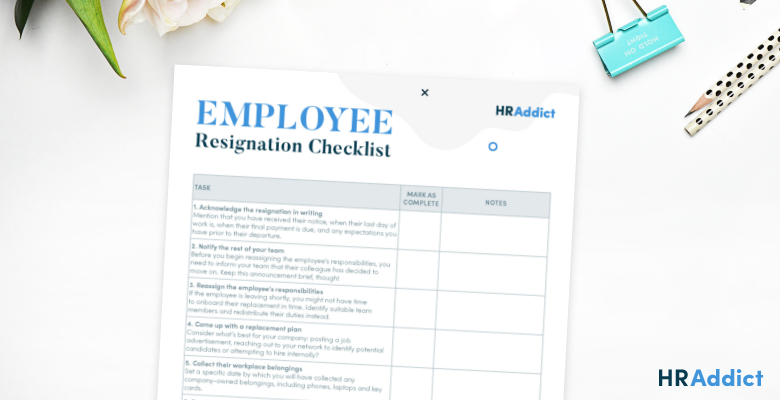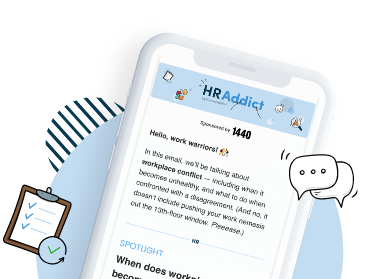When an employee asks you for a “quick chat” or “a few minutes in private”, it isn’t usually good news.
They nervously step into your office and silently mouth the words “I’m handing in my resignation”, leaving you in utter shock as you didn’t expect your stellar employee to flee and move away. You thought that they were in it for the long-haul — how mistaken and blindsided were you!
Whether you’re disappointed or feel a sense of relief, you need to tread carefully when a staff member resigns. You’ll need to follow the correct procedures and make the transition as smooth as possible for your team, your soon-to-be former employee and yourself.
The following tips and checklist will help you deal with any employee’s departure in a professional manner.
What to consider when an employee resigns
Even if you have dealt with it before, you may still catch yourself wondering what to do when an employee resigns — especially when the person departing has been one of the strongest assets on your team.
Before doing anything else, it can be useful to spend some time considering the following points:
- Whether this was this a “heat of the moment” resignation. Sometimes, when stress levels become heightened (especially during conflict), people may succumb and react hastily, without a lot of thought. Consider if this may be the case and what you might do should your employee retract their resignation.
- If this was, in the eyes of your employee, a constructive termination. Make sure to understand their reason for resigning; if they believe that you intentionally created hostile conditions to force them to leave, they might have a claim for wrongful constructive termination.
- If there are any post-termination restrictions the employee needs to be reminded of. This will already have been included in their employment contract, but you can benefit from reminding them of these conditions in a formal letter as a response to (and acknowledgment of) their resignation.
- When the employee’s final paycheck is due and what you owe them. Laws vary between states for when final pay must be submitted. The same stands for whether you must pay employees for unused vacation time, which is also determined by your company policy and contracts.
- What your response will be should they try to negotiate a shorter notice period. If you want to avoid burning bridges (this is particularly true in cases where notice periods span a month or longer), understand and evaluate the employee’s reasoning and see if you can meet in the middle.
Tips for dealing with employee resignations
In this section, we’ll be sharing a step-by-step guide on how to respond when an employee quits so you can navigate the process effectively without burning bridges.
1. Don’t take it personally
It’s hard to not take it personally when you have built a strong rapport with your team member and value their work ethic and opinion, but it’s important to remember that it’s not about you — but about their career progression. On the other hand, it could very well be because of a clash with another employee.
Whatever the case, you’ll find out in their exit interview, so don’t turn an already nerve-wracking situation into a disastrous one. Congratulate the employee and wish them every success in their new position.
2. Consider making a counteroffer
Whether you should or shouldn’t make a counteroffer comes down to “how critical this person is to you and how much of a disruption their absence will cause,” says Anat Lechner, a clinical associate professor of management and organizations at NYU Stern.
If they’re leaving for a similar job that offers a higher salary, it would be worth matching that offer and keeping them on at your company.
You’ll need to tread carefully and assess whether it really is worth continuing their employment or not — if they’re generally positive but feel undervalued, a counteroffer may be wise. If you’ve heard through the grapevine that they’re demotivated and bored at work, though, it might be beneficial to let them move on if you’re unable to offer them a promotion.
3. Get it in writing
The first step of an employee resigning will usually be in person; you’ll then need to ensure you have this in writing and should notify the HR department immediately.
Make sure the letter is signed and that their leaving date is in accordance with their notice period. If an employee breaches their contract and doesn’t serve their full notice period, their final pay will be affected. If they do break their contract, you could refuse to give them a reference if asked for one in the future.
4. Decide whether you want them to work their full notice period
Following on from the previous point, you can decide whether you want your staff member to work their full notice period or if you’re open to make an agreement and release them early.
You may find it more appropriate to pay in lieu of all or part of the notice period if you don’t want the employee to have access to any sensitive information and if it’s more beneficial for the company and the department. On the other hand, if the worker is of value, you can come to an agreement of an extended notice period (if they agree, of course) to ensure a smooth transition.
5. Agree on the terms of the announcement
It’s most likely that the employee’s closest colleagues already know about their departure, but it’s important to agree on how the announcement will be communicated to the rest of the team, nonetheless.
Should you gather your department together for a quick meeting, send an email around, or allow your employee to tell people one-to-one? Depending on the reason for their departure, they may feel more comfortable with you making the news public knowledge.
6. Come up with a transition plan
The most important step you need to take when a worker leaves is devising a transition plan. You need to ensure they finish all their projects, notify key clients of their departure and provide a proper handover to their replacement (if they arrive before they leave or if the recruiting has been done internally).
It would be best to get the employee to devise their own checklist and plan of action for their final 2–4 weeks and review it to ensure all angles are being covered.
Having a list of final to-dos will keep your employee motivated and encouraged during their last few weeks of employment and will ensure all loose ends are tied up before the cutting of their goodbye cake. It will be wise to keep tabs on their progress throughout this period and make sure they’re on track in their final week.
7. Evaluate their knowledge
Before an employee walks out the door, you need to ensure they’re not taking vital information with them, especially data and processes that no other employee knows. This doesn’t mean checking their bag for copies of contacts or financial reports but rather figuring out what unique skills they have that can be shared with their colleagues.
If you don’t evaluate their knowledge and get them to transfer it to other team members, it will walk straight out the door with them and you won’t be able to get it back — after all, it’s kind of unprofessional to haggle an ex-employee for information once they’ve left the company.
8. Start looking for a replacement
If you desperately need that position filled, you’ll need to start looking for a replacement immediately. It might be easier to recruit internally for that specific role to be filled, but you could benefit from advertising the job externally, too.
Don’t simply post the job spec that was used to hire the leaving employee, though; re-evaluate the position and include any other duties that your staff member took on. It’s also important to not just hire anyone because you’re desperate and should, therefore, consider delegating additional tasks between all team members until the ideal candidate comes along.
9. Stick to the legalities
When dealing with a resignation, it’s important to comply with employment law — final pay is usually due by the following payday. Depending on your company policies, you should advise the employee on benefits, pension schemes, holiday pay and healthcare.
Check your local law to ensure compliance and keep a record of when you provided the employee with their final pay, as well as send them their final pay slip by post or email.
10. Conduct an exit interview
Exit interviews are often overlooked when employees leave the company, but they’re crucial if you want to find out exactly why they’re departing.
This discussion should be carried out by a third party and preferably someone from the HR department — this way, they will be able to find out what the issues are with the company and what you can do to improve the culture for other workers. In cases where you have a troublesome employee, you might want to ask another coworker to sit in on the meeting and be a witness for both the employee and yourself.
11. Obtain company property
Be sure to obtain any company property before the employees last day — this includes things like uniforms, badges, keys, cards and phones or other electronics. Disable any building codes and access to any confidential data, including their email accounts.
12. Arrange a farewell gift or party
It’s important to gather your team on the last day and offer a farewell gift to the employee to thank them for their efforts and time with the company, and to wish them luck in their next position.
You could also arrange a cake and some drinks if the employee hasn’t already arranged something outside of working hours. “Failing to acknowledge an employee’s departure and his or her contributions sends a bad message to your team,” says Lechner.
13. Part ways on good terms
The person leaving could end up being your direct competitor or even a client. In any case, it’s important to part on good terms.
If you have built a good relationship with that staff member, make an effort to stay in touch; they may end up coming to work with you again in the future if their new adventures don’t quite work out as they had hoped.
Employee resignation checklist
Our 10-step checklist will help you ensure that you don’t forget to address any important matters or provide your (soon-to-be-former) employee with any crucial information — from the moment you first receive their notice until the moment you bid them farewell.
Final thoughts
It can be really overwhelming and stressful when an employee springs their resignation on you, especially during your busiest period.
Losing a vital member of your team is tough, but as a boss, you must have the skills and knowledge to deal with it. It’s best to have a plan of action for when these setbacks arise so you can easily move on and continue leading a strong team.
Have you ever had to deal with an employee resigning unexpectedly? How did you handle it? Let us know your experiences in the comment section below…
This article is a partial update of an earlier version originally published back in 2018, and contains contributions by Electra Michaelidou.


